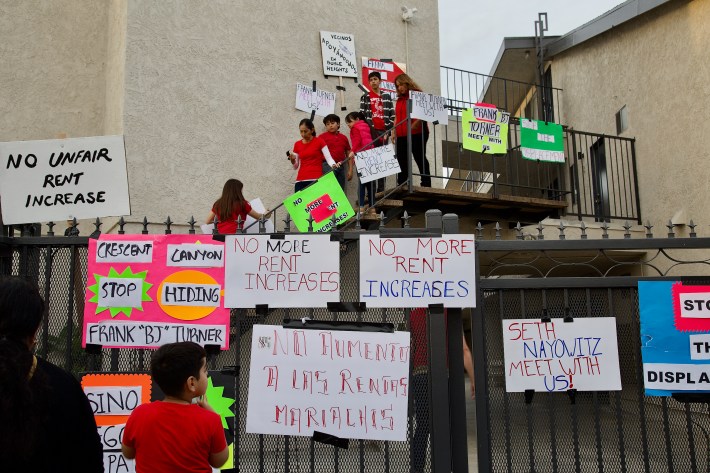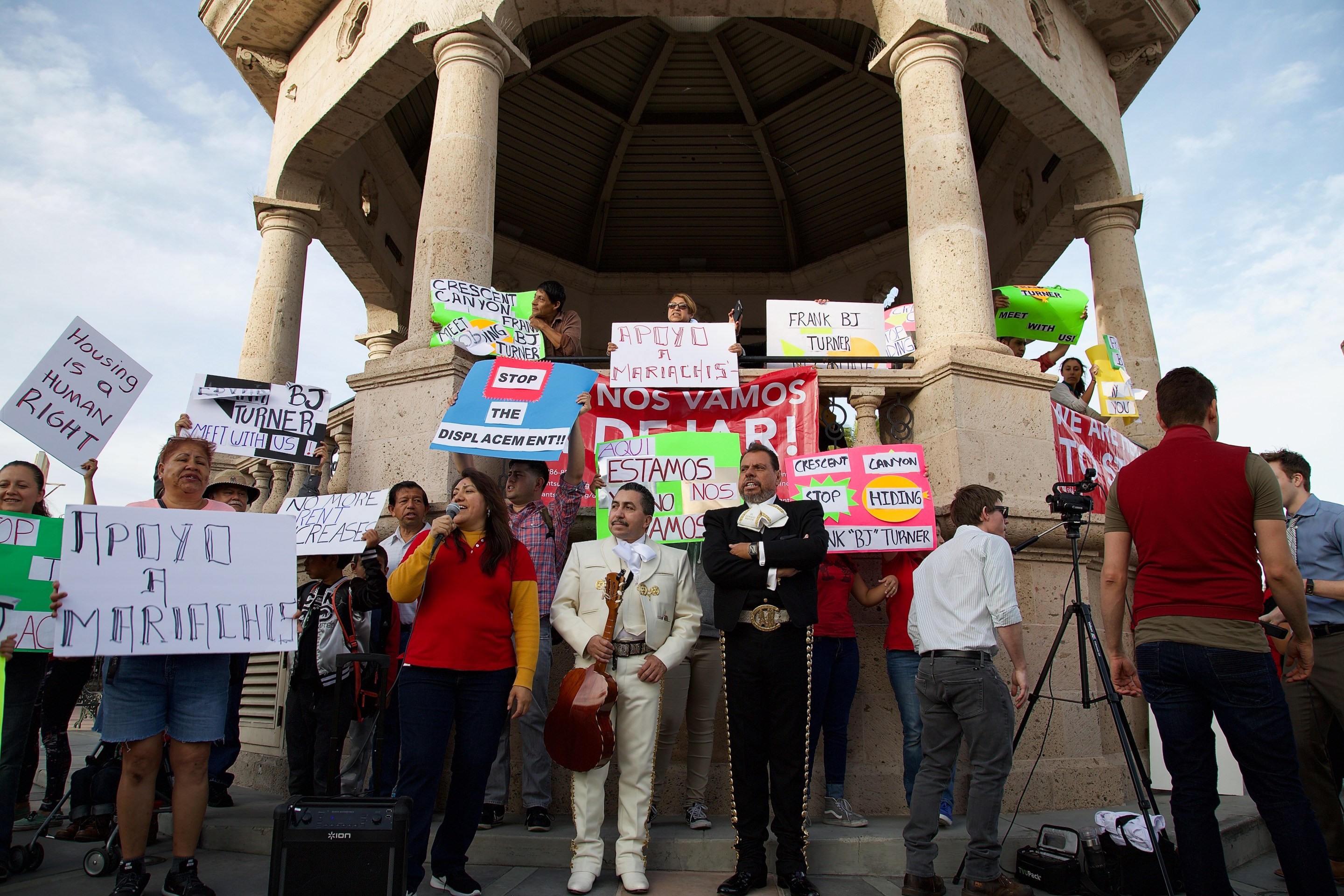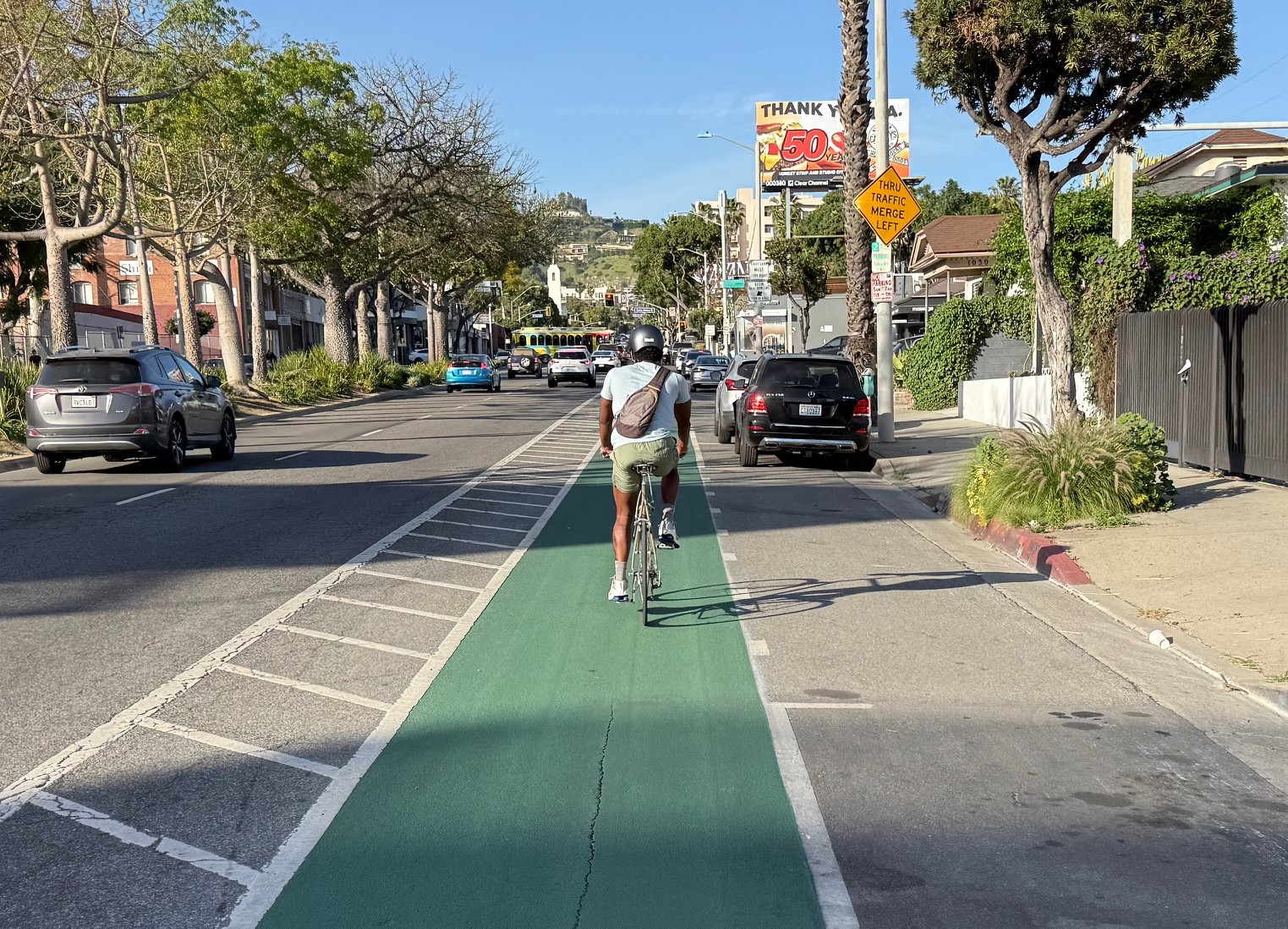Her own rent hadn't been raised, Irma Aguilar, a 20-year tenant at 1815 E. 2nd St. told the crowd gathered to celebrate tentants' successful negotiation of a collective rental agreement with building owner Frank "BJ" Turner, but she had decided to become a huelguista (join the rent strike) because she knew she would likely be targeted next.
The three-and-a-half year deal the tenants hammered out with Turner would mean that the rents he had attempted to raise by 60 to 80 percent last January would now only see a fourteen percent increase, with an allowance for a five percent increase each subsequent year. Back rent not paid during the nine months tenants were on strike would be recouped via the fourteen percent increase - they wouldn't have to pay additional sums to make up the difference. And at the end of the three-and-a-half year period, Turner agreed, he would enter into a new negotiation process with residents in good faith. Turner would also agree to make all necessary repairs to the units.
The victory comes as a tremendous relief for residents and the community alike after a very long and stressful year of fighting to be heard.
None of us could have paid the increases, Aguilar ruefully concluded her remarks to the crowd in Spanish. What they really wanted was to get us out of here, to displace us.
It was hard to argue with that.
Within a few weeks of buying the building located just a block from Mariachi Plaza at the end of 2016, Turner had raised rents on a handful of long-term tenants by between 60 and 80 percent. He had also created a website for the building, re-christened "Mariachi Crossing," targeting those that wanted a taste of a "vibrant" neighborhood and a Metro station within walking distance that could take them to experience the real excitement found Downtown. [The website has since been removed. The Craigslist ad with many of the same images and text is here.]
At the time, the new owners justified the hikes by claiming to be making significant upgrades to the communal elements of the property (laundry facilities, lighting, roofing, etc.). Tenants pushed back, saying that the owners had first told them they were going to upgrade the units to make them more luxurious, but then made only a few cosmetic improvements around the edges of the building, leaving tenants' long-standing issues and repairs unresolved.
To the tenants, the targeting of only seven units for increases meant Turner was testing out his ability to push people out. The fact that the building had been built after 1978 and was not under rent control protections made it all the easier for him to do so.
The move was seen as particularly insidious because not only would an $800 jump in rent have displaced mariachis like Luis and Enrique Valdivia and made it more difficult for them to reach Mariachi Plaza to get work, but Turner was using the idea of mariachis to essentially re-brand the place.
He appeared to be promising new residents cultural adjacency - they could feel they were linked to the spirit of a place without having to actually rub elbows with the locals.

Considering that as many as 15 mariachis occupied the building's 25 units - all of whom relied on access to the plaza to get jobs and all of whom would likely have found themselves displaced from Boyle Heights entirely - the expansion of rent hikes to the rest of the building would have dealt a significant blow to the health of the mariachi community and culture. Especially as others around the plaza were beginning to lose their battles against evictions and rent hikes as the year progressed.
So, when tenants first held a rally last April, they simply asked that Turner meet with the group, face to face.
They wanted him to understand that they were the heart of the community.
Displacement would not only put their way of life at risk, but also hurt the community for generations to come. The mariachi tradition is often passed down within families, but many also give lessons to area music students, they patronize (and keep alive) unique community-serving shops and region-specific restaurants with a long history in the area, and they provide a soundtrack for some of the most important moments of residents' lives.
Moreover, they had weathered the challenges the community had seen at the plaza and remained a key constant throughout. Having informally claimed the intersection at 1st and Boyle as a gathering space as early as the 1930s, the community essentially grew up around them. When the corner became a hub for less reputable and more dangerous endeavors in the 1980s, the presence of the mariachis helped to keep the space accessible to residents and kept local businesses like the donut shop they used as their de facto headquarters afloat. So much so that the transformation of the traffic triangle into a bona fide plaza in 1994 - imperfect a process as it may have been - was predicated on the idea that elevating the mariachis would also elevate and heal the community.
Now that the community they had helped build against all odds was finally more appealing to outsiders, tenants speaking at the April rally argued, developers, artists, and even public agencies were devaluing their contributions and eagerly pushing them aside.

To give Turner more incentive to meet with them, tenants continued to pay their regular rent and ignore the increases.
But instead of responding to their requests for a meeting to negotiate a reasonable rent increase, Turner returned their checks two months in a row.
It was stressful not knowing what their fate was going to be while still having to deal with a manager that regularly come through the building to tell tenants to leave, Luis Valdivia told me in April.
So when Turner finally expressed interest in meeting in June but put a number of conditions on the meeting (e.g. tenants had to meet with him individually), the tenants had had enough.
They refused the meeting.
They were subsequently sent eviction notices. By this time, however, they had rallied the support of neighbors like Aguilar, who agreed to take on the risk of a rent strike starting last July.
The coalition of 13 tenants - just over half the building - and a lot of bad press still seemed to have very little impact. Tenants were given court dates instead of meetings. So they took the fight to him, planning actions in his neighborhood throughout the fall, culminating with encampments outside his home in Rancho Park in December, where protesters spoke to Turner's neighbors about his actions in Boyle Heights.
They finally got their face-to-face meeting.
It was this "contacto persona a persona" Arturo Ramírez, president of the Organización de Mariachis Unidos de Los Ángeles (also pictured at top, next to Luis) told La Opinion, that finally allowed for an agreement to be reached.
The agreement itself is rare. Tenant organizing has been in the zeitgeist for some time; the late mayor of San Francisco Ed Lee made a name for himself in 1978 by organizing public housing tenants in a rent strike until the city remedied their poor living conditions. But the urgency of the displacement of lower-income communities of color has sparked renewed interest in the tactic, with embattled communities in Fillmore (San Francisco) and Brooklyn taking up the charge more recently.
And it certainly isn't the easiest way forward. The laundry list of people thanked by the tenants yesterday - including the L.A. Tenants Union and Unión de Vecinos for their advocacy, Defend Boyle Heights and BHAAAD for pushing local, national, and international conversations on gentrification, the Democratic Socialists of America for their support, lawyers from the Los Angeles Center for Community Law and Action for steering tenants through a complex legal system, Councilmember José Huizar, lawyer Richard Daggenhurst, and their own neighbors for having been willing to put the larger community's needs ahead of their own - spoke to the costs of sustaining such an endeavor over the long haul.
Speaking on behalf of Unión de Vecinos - the tenant rights group that was the first to come to the residents' aid, Elizabeth Blaney said the victory was possible because of the long history of organizing within the community itself. "Gentrification is not inevitable," she declared.
Valdivia, for his part, having received job, housing, community, and cultural security all in one fell swoop the victory appeared to be overwhelming.
Honestly, it is going to have a significant impact because we are now assured that we can stay here for another three-and-a-half years...he told the crowd in Spanish. I cannot emphasize enough how big this is for us.
As mariachis, he continued, they are dependent on access to the plaza just around the corner from here. And as someone who had been an integral member of the community for more than 30 years, he concluded, Aquí queremos vivir. [Here is where we want to live.]
Listen to the mariachis and hear comments from residents at last night's gathering here.







